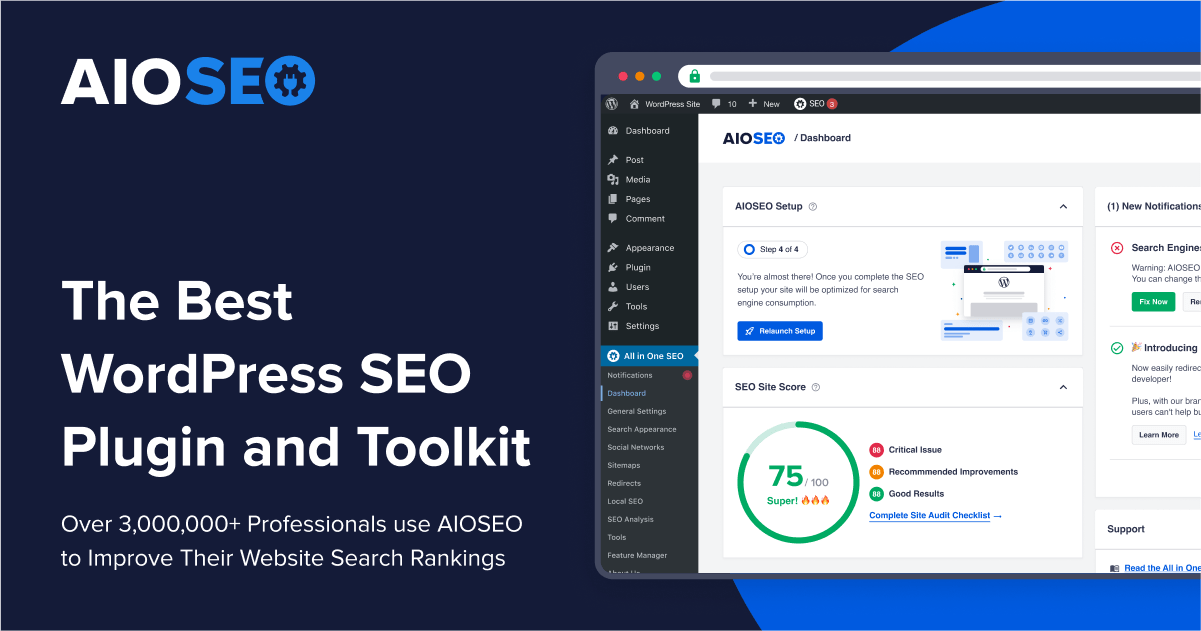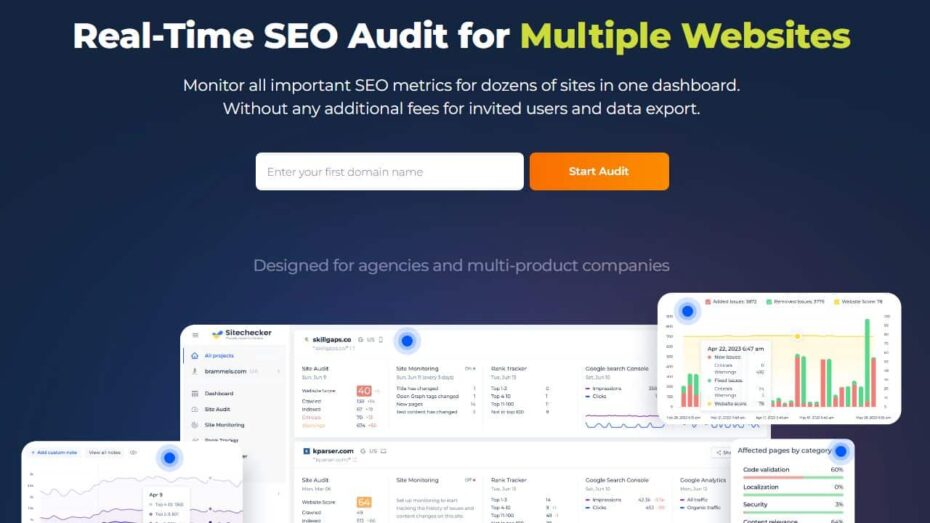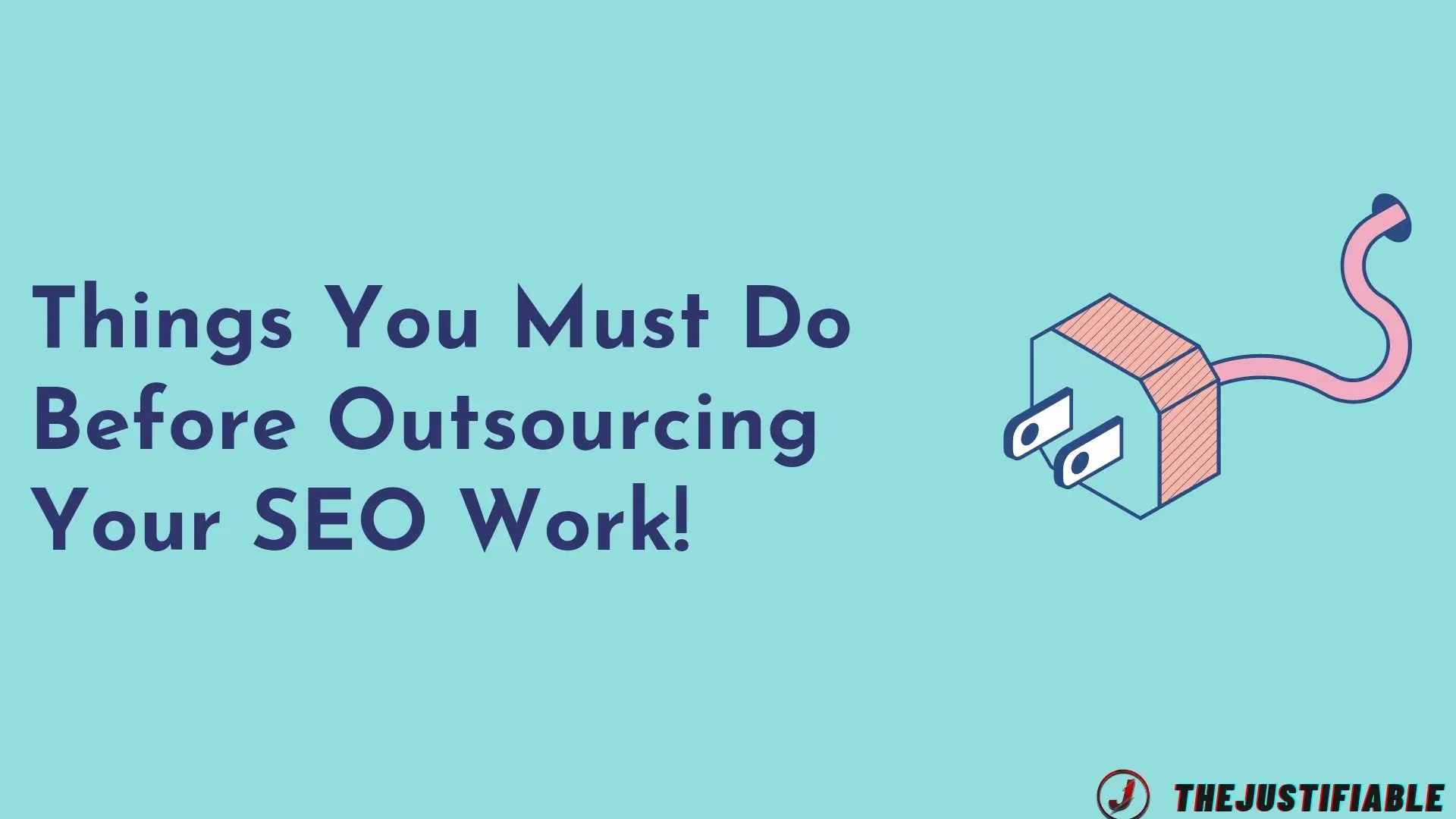Table of Contents
Outsourcing your SEO work can significantly impact your business’s online visibility and success. To ensure you make the most of this strategic move, there are critical steps to follow.
This article will guide you through the essential factors to consider before outsourcing, ensuring you make informed decisions for optimal results.
Assess Your Current SEO Performance
Assessing your current SEO performance is crucial before outsourcing. Understanding where you stand helps you set realistic goals and identify areas that need improvement. By doing this, you ensure that the outsourced team can effectively enhance your SEO strategy.
Evaluating your SEO performance involves a thorough analysis of your website’s health, keyword rankings, and overall visibility. This step is essential to create a strong foundation for your future SEO efforts. Let’s explore how you can effectively assess your current SEO status.
SEO Services Recommendations
 AIOSEO
|  Sitechecker
|  Squirrly
|
Conduct a Comprehensive SEO Audit
A comprehensive SEO audit is the first step in assessing your SEO performance. This audit provides a detailed overview of your website’s strengths and weaknesses, helping you understand what needs attention.
Start by analyzing your website’s on-page SEO elements. This includes checking the quality of your content, keyword usage, meta tags, and header tags. Ensure that your content is engaging and uses the primary keyword naturally. Next, evaluate your technical SEO aspects, such as site speed, mobile-friendliness, and crawlability. These factors significantly impact your site’s performance in search engines.
Additionally, review your backlink profile. Quality backlinks are essential for SEO success, so identify any toxic or low-quality links that could harm your rankings. Use tools like Google Search Console and third-party SEO software to gather detailed insights and data for your audit.
Identify Strengths and Weaknesses
After conducting your SEO audit, it’s time to identify your strengths and weaknesses. This step allows you to focus on what’s working well and address areas that need improvement.
Begin by listing your top-performing pages and keywords. These are your strengths, showcasing where your SEO strategy is effective. Analyze why these pages perform well – it could be due to high-quality content, effective keyword usage, or strong backlinks. Understanding these factors helps you replicate success across other areas of your site.
On the other hand, pinpoint pages with low traffic or poor engagement. These weaknesses indicate where your SEO efforts are falling short. Investigate potential reasons, such as thin content, lack of keywords, or technical issues. By addressing these weaknesses, you can enhance your overall SEO performance and boost your site’s visibility.
Review Analytics and Performance Metrics
To fully understand your SEO performance, you need to review your analytics and performance metrics. These metrics provide valuable insights into how users interact with your site and where you can make improvements.
Start with Kissmetrics to track key metrics like organic traffic, bounce rate, and average session duration. High bounce rates or low session durations can indicate issues with your site’s content or user experience. Use this data to make necessary adjustments and improve user engagement.
Additionally, review your keyword rankings and compare them with your competitors. Tools like SEMrush or Ahrefs can help you track keyword performance and identify opportunities for improvement. Monitor your site’s performance regularly to stay updated on changes and trends in your SEO landscape.
Define Clear SEO Goals and Objectives
Defining clear SEO goals and objectives is essential before outsourcing your SEO work. This step ensures that you and your outsourced team are aligned on what needs to be achieved, leading to more effective strategies and better results. Clear goals provide direction and help measure the success of your SEO efforts.
Setting well-defined SEO goals allows you to focus on specific outcomes, whether it’s increasing organic traffic, improving keyword rankings, or enhancing user engagement. By establishing these objectives upfront, you create a roadmap for your SEO strategy, making it easier to track progress and make necessary adjustments.
Set Specific, Measurable Goals
Setting specific, measurable goals is crucial for effective SEO. These goals should be detailed and quantifiable, allowing you to track your progress and measure success accurately. Vague goals like “increase traffic” are less effective than precise targets such as “increase organic traffic by 20% in six months.”
To set measurable goals, start by analyzing your current SEO performance. Identify key metrics like organic traffic, conversion rates, and keyword rankings. Use these benchmarks to establish realistic targets. For instance, if your current organic traffic is 10,000 visitors per month, a specific goal could be to reach 12,000 visitors within the next quarter.
Measurable goals also facilitate better communication with your outsourced SEO team. Clear targets provide them with a precise understanding of your expectations, enabling them to develop strategies that align with your objectives. Regularly review these goals to ensure they remain relevant and adjust them as needed based on your site’s performance and market conditions.
Align Goals with Business Objectives
Aligning your SEO goals with your broader business objectives ensures that your SEO efforts contribute to your overall success. This alignment helps in prioritizing SEO tasks that have a direct impact on your business growth and profitability.
Begin by identifying your core business objectives, such as increasing sales, expanding market reach, or enhancing brand awareness. Once you have these objectives in mind, align your SEO goals accordingly. For example, if your business goal is to boost online sales, your SEO objective might be to rank higher for product-related keywords that drive purchase intent.
This alignment also helps in resource allocation. By focusing on SEO activities that directly support your business goals, you ensure that your time and budget are invested in the most impactful areas. Additionally, it fosters a cohesive strategy where all marketing efforts are integrated and working towards common targets, enhancing overall efficiency and effectiveness.
Prioritize Short-Term and Long-Term Goals
Prioritizing both short-term and long-term goals is essential for a balanced SEO strategy. Short-term goals provide immediate results and quick wins, while long-term goals focus on sustainable growth and long-lasting improvements.
Short-term goals might include tasks like optimizing existing content, fixing technical SEO issues, or launching a new keyword campaign. These goals are typically achievable within a few months and can provide a noticeable boost to your SEO performance. For example, improving site speed or updating meta tags can quickly enhance user experience and search engine rankings.
Long-term goals, on the other hand, require a more strategic approach and a longer timeframe. These goals could involve building a robust backlink profile, creating high-quality content, or improving domain authority. Long-term objectives are crucial for maintaining and enhancing your SEO performance over time. They ensure that your site remains competitive and continues to attract organic traffic in the future.
Balancing short-term and long-term goals ensures that you achieve immediate results while also working towards sustainable growth. Regularly review and adjust these goals based on your SEO performance and changing market trends to stay on track and achieve continuous improvement.
Understand Different SEO Service Models
Understanding different SEO service models is crucial when considering outsourcing. Knowing the various options available allows you to choose the one that best fits your business needs and goals. This knowledge helps you make informed decisions and ensures that your SEO efforts are aligned with your overall strategy.
Exploring the differences between in-house SEO and outsourced SEO is the first step. It helps you understand the benefits and drawbacks of each model, making it easier to decide which approach will deliver the best results for your business.
Compare In-House vs. Outsourced SEO
When comparing in-house SEO to outsourced SEO, it’s important to consider several factors. In-house SEO involves hiring and maintaining a dedicated team within your organization. This approach offers the advantage of having a team that is fully immersed in your brand, understanding its nuances and goals intimately.
However, in-house SEO can be costly and resource-intensive. Recruiting, training, and retaining skilled SEO professionals requires significant investment. Additionally, an in-house team might lack the diverse expertise and perspectives that an external agency can provide.
Outsourced SEO, on the other hand, allows you to leverage the expertise of specialized agencies. These agencies typically have a broad range of skills and access to advanced tools and resources. Outsourcing can be more cost-effective, as you only pay for the services you need without the overhead costs associated with an in-house team. However, it requires thorough research to find a reliable partner who understands your business and can deliver results.
Explore Various Outsourcing Options
Exploring various outsourcing options helps you find the right fit for your business. There are several types of SEO service providers, including full-service agencies, specialized SEO firms, and freelance consultants. Each option has its own set of advantages and considerations.
Full-service agencies offer comprehensive solutions, covering all aspects of SEO from technical audits to content creation and link building. They are ideal for businesses looking for an all-in-one solution. Specialized SEO firms, on the other hand, focus on specific areas such as local SEO, e-commerce SEO, or link building. These firms are great if you need targeted expertise in a particular aspect of SEO.
Freelance consultants provide a more flexible and often cost-effective option. They are suitable for smaller projects or when you need specific expertise on a temporary basis. However, managing freelancers requires clear communication and project management to ensure consistency and alignment with your goals.
Evaluate Cost-Effectiveness
Evaluating the cost-effectiveness of different SEO service models is essential to ensure you get the best value for your investment. Start by defining your budget and the specific outcomes you expect from your SEO efforts. This will help you compare the costs and benefits of in-house and outsourced SEO more effectively.
Consider the long-term costs of maintaining an in-house team, including salaries, benefits, training, and tools. Compare these with the costs of outsourcing, which typically involve a monthly retainer or project-based fees. Outsourcing can often provide a higher return on investment due to the specialized skills and resources that agencies bring.
Additionally, evaluate the potential impact on your business goals. Outsourced SEO can offer quicker results due to the expertise and experience of the agency, potentially leading to faster growth in organic traffic and conversions. However, it’s important to ensure that the cost savings do not come at the expense of quality and consistency in your SEO efforts.
Research Potential SEO Partners Thoroughly
Researching potential SEO partners thoroughly is a critical step before outsourcing. This ensures that you choose a reliable and competent partner who can deliver on your SEO goals. A well-researched decision minimizes risks and maximizes the chances of a successful partnership.
Start by identifying potential SEO agencies or consultants and gather as much information as possible about their background, expertise, and track record. This research will provide a solid foundation for making an informed choice.
Check Company Credentials and Experience
Checking the credentials and experience of potential SEO partners is essential. Look for agencies with a proven track record in delivering successful SEO campaigns. Examine their portfolio and case studies to understand the types of businesses they have worked with and the results they have achieved.
Consider the agency’s experience in your specific industry or niche. An agency with experience in your field will have a better understanding of the market dynamics and the specific challenges you face. This specialized knowledge can lead to more effective and targeted SEO strategies.
Additionally, verify the agency’s credentials, including certifications and partnerships with reputable organizations. These credentials can provide an additional layer of assurance about the agency’s expertise and professionalism.
Read Client Testimonials and Case Studies
Reading client testimonials and case studies provides valuable insights into the agency’s performance and client satisfaction. Testimonials from previous clients can give you a sense of the agency’s strengths, reliability, and customer service.
Look for detailed case studies that outline the challenges faced by the client, the strategies implemented by the agency, and the results achieved. Case studies provide a concrete example of the agency’s capabilities and their approach to solving SEO problems.
Pay attention to any recurring themes or patterns in the testimonials and case studies. Consistent positive feedback on specific aspects, such as communication, transparency, or results, can indicate the agency’s strong points and reliability.
Analyze Their SEO Strategies and Tools
Analyzing the SEO strategies and tools used by potential partners helps you understand their approach and whether it aligns with your goals. Ask the agency about their SEO methodologies and how they plan to address your specific needs.
Evaluate the tools and technologies they use for keyword research, site audits, backlink analysis, and performance tracking. Advanced tools and data-driven strategies are crucial for effective SEO. Ensure that the agency stays updated with the latest SEO trends and algorithm changes to keep your strategy current and effective.
Discuss the agency’s approach to content creation, link building, and technical SEO. A comprehensive strategy that covers all aspects of SEO is essential for long-term success. Make sure their methods are ethical and adhere to search engine guidelines to avoid any potential penalties.
Establish Clear Communication Channels
Establishing clear communication channels is crucial when outsourcing your SEO work. Effective communication ensures that both parties are aligned on goals, progress, and expectations. This helps in building a strong partnership and achieving better results from your SEO efforts.
Clear communication involves setting up structured processes for regular updates, defining points of contact, and scheduling regular meetings. These steps help in maintaining transparency and accountability, ensuring that your SEO strategy is executed smoothly and efficiently.
Set Expectations for Reporting and Updates
Setting expectations for reporting and updates is essential to keep track of your SEO progress. Regular reports provide insights into the effectiveness of the strategies being implemented and highlight areas that need improvement. This helps you make informed decisions and adjustments as needed.
When establishing reporting expectations, discuss the frequency and format of the reports. Decide whether you prefer weekly, bi-weekly, or monthly updates. Ensure that the reports include key metrics such as organic traffic, keyword rankings, and conversion rates. Detailed reports help you understand the impact of the SEO efforts and the return on your investment.
Additionally, set expectations for the type of updates you want to receive. This could include progress on specific tasks, challenges encountered, and upcoming plans. Regular updates foster transparency and keep you informed about the ongoing activities, ensuring that you are always in the loop.
Define Points of Contact
Defining points of contact is vital for smooth communication. Clear points of contact ensure that there is always someone available to address questions, provide updates, and resolve issues promptly. This helps in maintaining continuity and avoiding any communication gaps.
Start by designating a primary contact person from both your side and the SEO agency. This person will be responsible for coordinating and managing the communication between the two parties. Ensure that the contact person is knowledgeable about the project and can make decisions or escalate issues as needed.
In addition to the primary contact, identify secondary contacts who can step in if the primary contact is unavailable. This ensures that there is always someone accessible to handle urgent matters. Clear points of contact help in building a reliable and responsive communication framework, facilitating effective collaboration.
Schedule Regular Meetings
Scheduling regular meetings is an important aspect of maintaining effective communication. These meetings provide a platform to discuss progress, address concerns, and plan future activities. Regular interactions help in building a strong working relationship and ensuring that everyone is on the same page.
Decide on the frequency of the meetings based on your project needs. Weekly or bi-weekly meetings are common for ongoing projects, while monthly meetings might suffice for less intensive collaborations. Ensure that the meetings are structured and have a clear agenda to make them productive and focused.
During the meetings, review the progress of the SEO efforts, discuss any challenges, and brainstorm solutions. Use this time to align on upcoming tasks and set priorities. Regular meetings provide an opportunity for real-time feedback and adjustments, enhancing the overall effectiveness of your SEO strategy.
Prepare Your Team for Collaboration
Preparing your team for collaboration is essential to ensure a seamless partnership with your outsourced SEO provider. A well-prepared team can contribute effectively to the project and help in achieving the desired outcomes. This involves training your team on SEO basics, encouraging open communication, and fostering a collaborative environment.
By equipping your team with the necessary knowledge and skills, you create a supportive and engaged workforce that can work efficiently with the external SEO team. This preparation helps in maximizing the benefits of outsourcing and achieving your SEO goals.
Train Your Team on SEO Basics
Training your team on SEO basics is the first step in preparing them for collaboration. A basic understanding of SEO concepts and practices enables your team to contribute meaningfully to the project and collaborate effectively with the external SEO team.
Start by providing training sessions or workshops on fundamental SEO topics such as keyword research, on-page optimization, and link building. This training helps your team understand the core principles of SEO and how they impact your website’s performance. Additionally, introduce them to the tools and software used for SEO analysis and reporting.
Encourage your team to stay updated with the latest SEO trends and algorithm changes. This ongoing learning ensures that they remain informed and can support the SEO efforts more effectively. A well-trained team can provide valuable insights and assist in implementing SEO recommendations, enhancing the overall success of the project.
Encourage Open Communication
Encouraging open communication within your team is crucial for effective collaboration. Open communication fosters a culture of transparency and trust, allowing team members to share ideas, ask questions, and provide feedback freely.
Create an environment where team members feel comfortable expressing their thoughts and concerns. Regularly check in with your team to address any issues and provide support as needed. Use collaboration tools such as Slack or Microsoft Teams to facilitate real-time communication and ensure that everyone stays connected.
Open communication helps in identifying potential challenges early and finding solutions collaboratively. It also encourages active participation from all team members, leading to more innovative and effective SEO strategies. By promoting a culture of openness, you enhance teamwork and ensure that your SEO efforts are well-coordinated and successful.
Foster a Collaborative Environment
Fostering a collaborative environment is essential for seamless teamwork between your internal team and the outsourced SEO provider. A collaborative environment encourages shared responsibility, mutual respect, and a unified approach to achieving the SEO goals.
Start by setting clear roles and responsibilities for each team member. Ensure that everyone understands their contributions and how they fit into the overall project. This clarity helps in avoiding confusion and overlaps, ensuring that all tasks are executed efficiently.
Encourage regular interactions and brainstorming sessions between your team and the SEO agency. These collaborative efforts can lead to new ideas and innovative solutions, enhancing the overall effectiveness of the SEO strategy. Celebrate successes and acknowledge the contributions of each team member to build morale and foster a positive working atmosphere.






